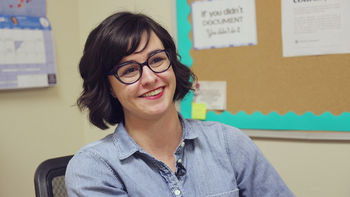Meet Alex Franks-Thomas, School Psychologist of the Year

Alex Franks-Thomas is a strong believer that education is a team sport.
As a school psychologist whose caseload is spread across hundreds of students in two North Thurston schools, Franks-Thomas is not afforded the luxury of time to teach students individually. As a psychologist, her primary role is to assess and decode the intertwined world of a student’s social-emotional, behavioral and academic performance. But at her core, she views herself as an educator.
“The passion that brings me to this role is figuring out why our general education strategies and curriculums don’t work for students,” Franks-Thomas says, “and how we can, as the grown-ups that support the students, how can we change what we’re doing to help the student access their education.”
That means evaluating and understanding the physical challenges and neurological barriers facing a student, and then translating that knowledge into options that special education teachers, general education teachers and parents can employ to help the child succeed.
“When I leave school for the day,” she reflects, “I want to make sure that they have the tools they need to provide the best services and access to education for students they can. . . I really see education as a civil right for all students, and making sure that we are doing the best work by our students so that all kiddos can participate is really important to me.”
With a commitment to teamwork and advocacy, Franks-Thomas has been recognized as the school psychologist of the year by the Washington State Association of School Psychologists. She also serves as WSASP’s president-elect and chair of its communications committee.
Washington’s nearly 1,200 school psychologists connect the worlds of psychology and education, bringing expertise from both disciplines. Their training program spans three years, she notes, culminating in an educational specialist degree vs. a master's degree, and the third year is a 1,200-hour internship in schools.
“In order to do special-education evaluations, we have to have comprehensive training in all aspects of student development, so that way we’re able to identify what might be atypical,” she says. “We also have to learn everything that is expected or typical about student development and learning. . . We have a lot of training in behavior and understanding functions of behavior, neuropsychology, so understanding how the brain develops and how that relates to student learning and behavior.”
Duties for individual school psychologists vary widely depending on their specific student population, grade levels, role expectations of their building or district teams and more. Franks-Thomas views her contribution as “being able to really do a deep-dive on a specific student, and what their performance and their ability looks like, and what factors may contribute to or may hinder their academic or social-emotional performance.”
It’s no secret that overwhelming caseloads are among the biggest challenges for school psychologists and other education specialists. Franks-Thomas, a WEA / North Thurston EA member, is excited about the joint efforts of WEA and WSASP to create systemic changes and increase the share of funding that is allocated for ESAs.
“We all have to work together and be collaborative and communicate with each other so that we can have the best outcomes for students. I think that's really important.”


